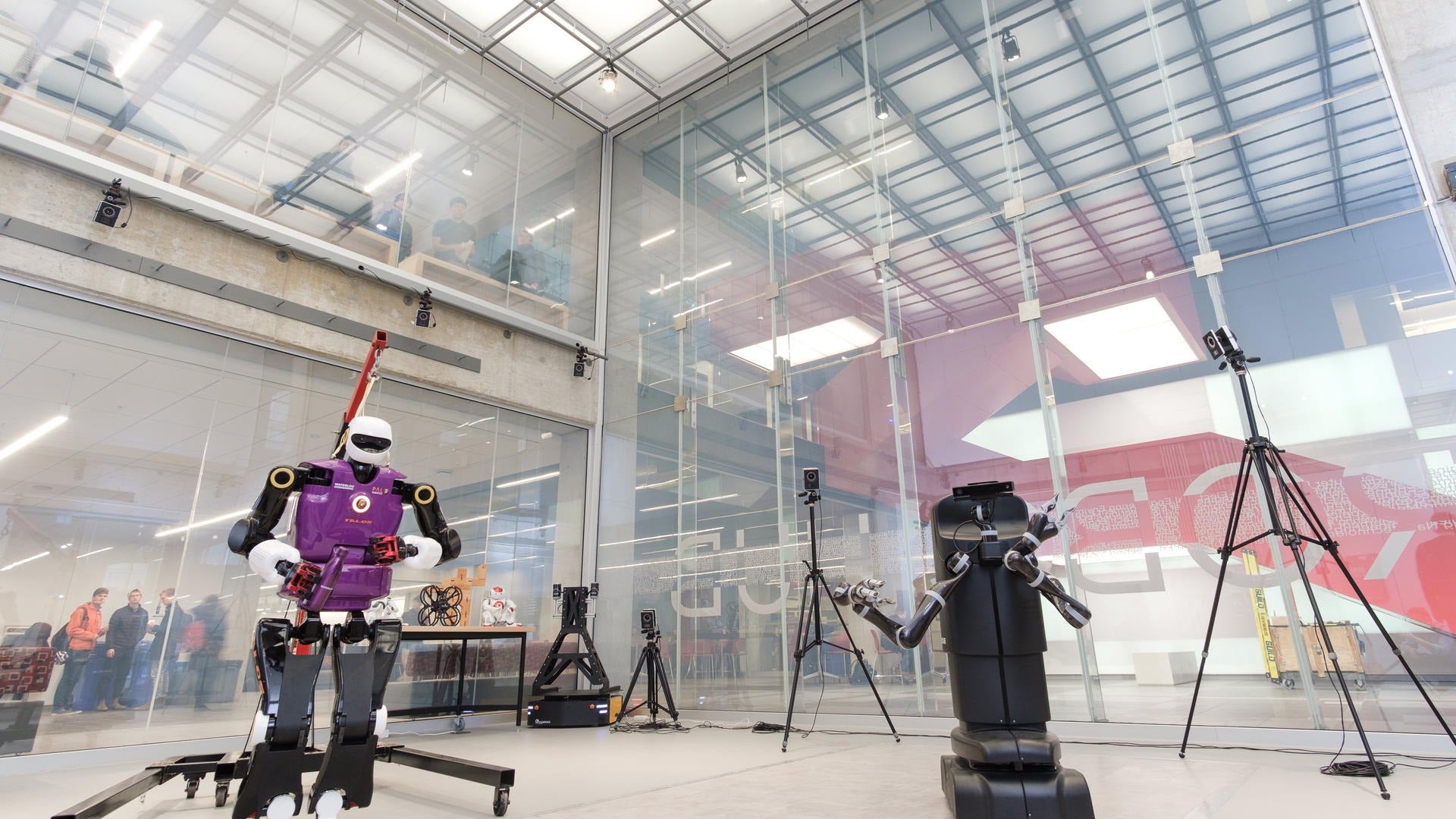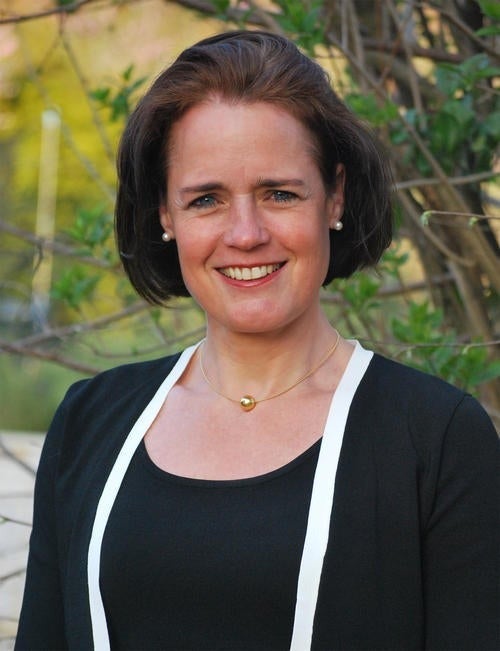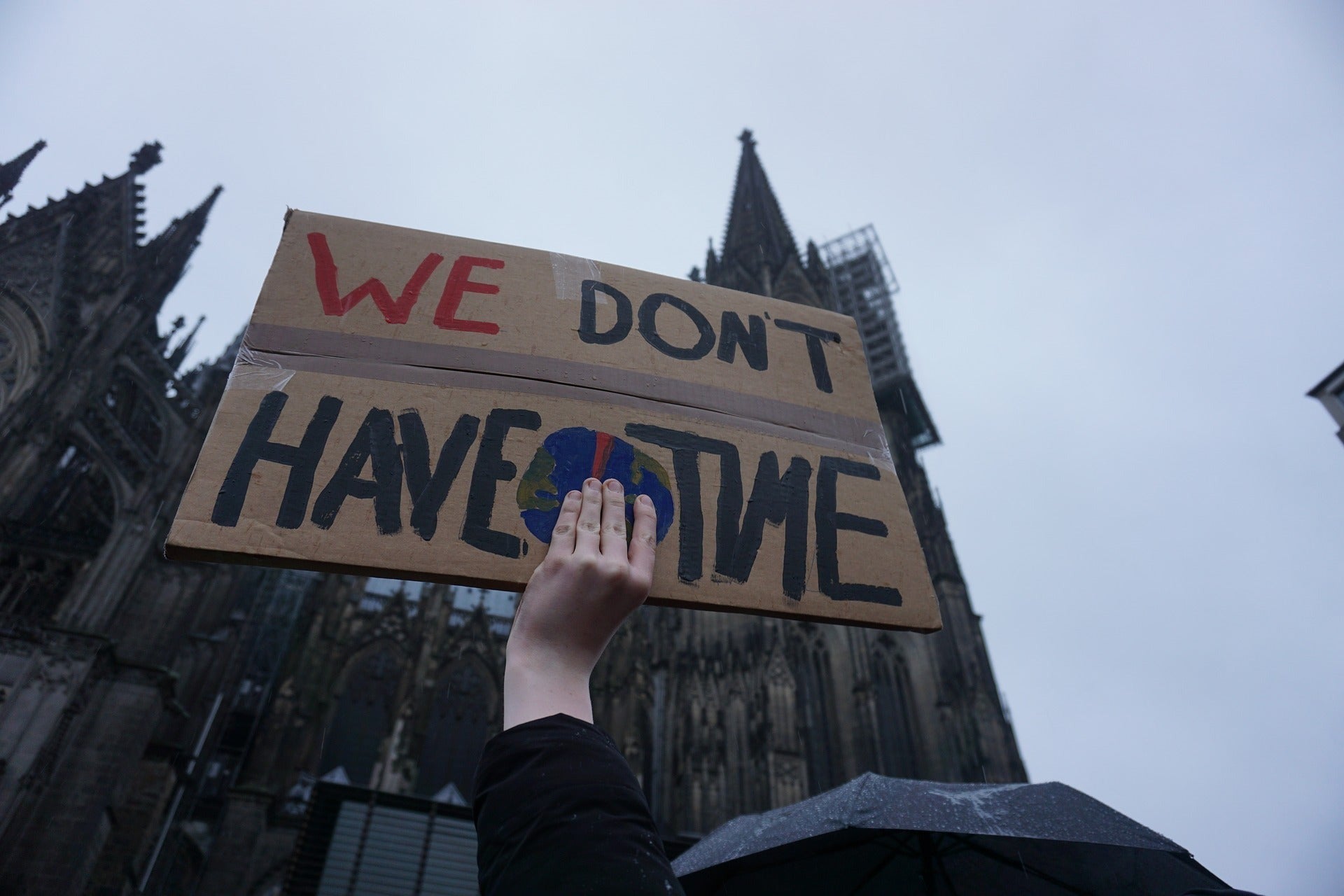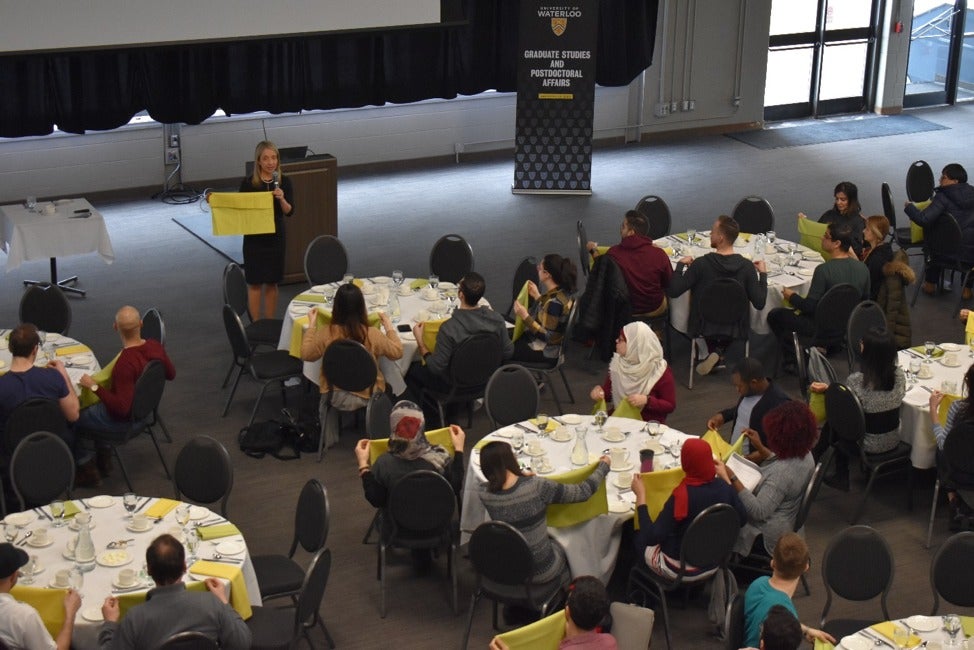Editor:
Brandon Sweet
University Communications
bulletin@uwaterloo.ca
New Canada Excellence Research Chair to focus on humanizing machines

Die Roboter: two droids do the robot in Waterloo's RoboHub.
This is a version of an article originally published on Waterloo Stories.
An international robotics expert from Germany is joining the University of Waterloo to lead a multidisciplinary research program backed by $10 million in funding from the federal government.

Katja Mombaur, now a professor at Heidelberg University, will take up the new post in March following her appointment to a prestigious Canada Excellence Research Chair (CERC) in Human-Centred Robotics and Machine Intelligence.
She is one of eight new chairs recently named by Kirsty Duncan, the Minister of Science and Sport, under a government program to attract world-renowned researchers and their teams to Canadian universities.
Five of the eight appointees, who work in areas including the precision design of cancer drugs and Arctic ice and climate change, are women. In addition to Germany, they come from as far away as Denmark, Greece and Finland.
“This talented and diverse group of research leaders is an excellent example of how when we bring together new points of view, we make science and research stronger,” Duncan said.
As a cross-appointed professor of systems design engineering and mechanical and mechatronics engineering at Waterloo, Mombaur will collaborate with colleagues in diverse fields including engineering, mathematics, health and cognitive sciences, philosophy and ethics.
“The idea is to bring all of them together to develop human-centred technology that will be accepted by society and improve our quality of life - and I think this will be a great place to do that,” she said. “Waterloo Engineering is very famous for robotics, for artificial intelligence (AI), and there are so many people I can connect with.”
Federal funding over seven years will be augmented by more than $15 million in support from the University. Nine new faculty positions targeting robotics and AI will be created in mechatronics engineering, biomedical engineering and a new area in human-machine interaction.
“Professor Mombaur’s vision is completely aligned with our own, and represents a strategic investment in research excellence and cutting-edge technology, purposely designed to accommodate everyone and enrich all our lives,” said Feridun Hamdullahpur, president and vice-chancellor of Waterloo. “We eagerly anticipate bringing her to Canada to lead this ambitious research program.”
Questions at the heart of Mombaur’s work involving wearable and humanoid robots include how increasingly intelligent machines can operate safely and efficiently in a complex human world, and how they should behave in that world.
A mathematician as well as an engineer, she uses mathematical modeling to teach robots how to move and to design the best possible assistive devices, such as exoskeletons and prosthetic limbs, for the elderly and disabled.
Her research program will focus on what Mombaur calls “motion intelligence,” a particular kind of AI that incorporates understanding of human movement and anticipation of human actions.
“Teaching autonomous robots to walk and act safely and reliably extends the limits of technology,” she said. “It will allow them to assist humans with dangerous, tiring or repetitive tasks, to work remotely or hand-in-hand with human collaborators.”
Read the rest of the article on Waterloo Stories.
Are we all a little guilty of denying climate change?

This is an excerpt of an article originally published on Waterloo Stories.
It’s easy to spot traditional climate change denial. Just read the comments on social media or comments from public officials. Deniers say it’s a hoax, a cash grab or a natural process. They’re wrong.
Most data suggests that all but a handful of Canadians accept that human behaviour impacts the climate. But that doesn’t mean we’re past climate denial. According to University of Waterloo environmental humanities professor Andrew McMurry, we’re eager to accept that something bad is happening, but are in denial about what’s actually threatening us and that we need difficult transformative action to beat climate catastrophe.
“Our failure to act could be a rhetorical problem,” argues the author of Entertaining Futility: Despair and Hope in the Time of Climate Change. McMurry, who has a background in biology and a long-held interest in conservation, examines how language, narrative and cultural tradition shape our beliefs and understanding about the environment.
And it’s never been more crucial. Nearly everything we do — the food we eat, the goods and services we rely on — produces greenhouse gases. Trying to fix this problem requires a top-down reordering of how we live, especially how we produce and consume energy.
So why aren’t we doing it?
Read the rest of the article on Waterloo Stories.
'Professionalism in context' workshop series a success

Postdocs and PhD students learning how to fold their napkin at a Dining Etiquette workshop on April 2.
On April 2, Graduate Studies and Postdoctoral Affairs (GSPA) hosted its fourth and final workshop in the “Professionalism in Context” series, a workshop series funded by Waterloo International through its Internationalization Fund.
Designed for emerging scholars who are soon going to be entering careers in industry, government, or academia, the workshop series covered four key areas of professionalism: workplace best practices, intercultural communication, professional appearance and dining etiquette.
To Angela Rooke, Manager, Graduate and Postdoctoral Experience, who wrote the successful proposal for the series, the dining etiquette workshop was a highlight. “PhD students and postdocs were able to enjoy a three-course meal at Fed Hall after the dining etiquette workshop, which covered some really challenging topics such as who pays the bill, how to hold your silverware, and the proper way to eat soup.”
She points out that emerging scholars are expected to exhibit a high degree of professionalism at conferences, interviews, business lunches, and meetings, but this kind of training is not generally provided to them. This becomes especially challenging when cultural norms and expectations are at play. The workshop series was tailored to Waterloo’s culturally diverse group of PhD students (nearly 40 percent international) and postdocs (55 percent international). By facilitating a smoother transition to professional contexts, both in Canada and abroad, this workshop series further enhances Waterloo’s reputation as a preeminent source of highly-trained, professional, and culturally diverse researchers.
Link of the day
When and where
Examination period, Wednesday, April 10 to Saturday, April 27.
MFA Thesis One exhibition, Thursday, April 11 to Saturday, April 27, UW Art Gallery.
Advanced Manufacturing Consortium (AMC) Showcase, Tuesday, April 23, 8:00 a.m. to 1:30 p.m., Engineering 7 second floor event space.
Sanofi Biogenius Canada Southwestern Ontario Regional Final, Tuesday, April 23, 9:00 a.m. to 6:30 p.m., Science Teaching Complex.
SEE Canada Grant Information Session, Tuesday, April 23, 12:00 p.m., DC 1304.
Research Talks: A new reality: Exploring dimensions of immersive learning featuring Waterloo researchers Neil Randall and Jennifer Boger, as well as Ben Sainsbury of Marion Surgical and Evan Jones of Stitch Media, Tuesday, April 23, 11:45 a.m. to 1:00 p.m., DC 1302. Please register as seating is limited.
Tenure & Promotion Workshop Series, Wednesday, April 24 and Thursday, April 25, various times and locations.
Staff appreciation menu at the University Club, Wednesday, April 24 to Friday, April 26, 11:30 a.m. to 2:00 p.m., University Club.
Pharmacy Research Day, Wednesday, April 24, all day, Pharmacy Building. RSVP.
FAUW workshop, Navigating your First Probationary Term, Wednesday, April 24, 10:00 a.m., M3 3103.
Research Ethics drop-in training session, Wednesday, April 24, 10:00 a.m. to 12:00 p.m., Dana Porter Library.
NEW - Waterloo Women's Wednesdays: Canada’s Food Guide 2019 – Building a healthy plate, Wednesday, April 24, 12:00 p.m. to 1:00 p.m., B1 266.
FAUW workshop, Applying for contract renewal, Wednesday, April 24, 1:00 p.m. to 2:30 p.m., M3 3103.
WISE Public Lecture: Utility of the Future – Perspective from a Local Distribution Company featuring Umar Waqas, P.ENG, CEM, Director, Engineering Services, Energy+ Inc., Wednesday April 24, 1:00 p.m. to 2:00 p.m., CPH 4335.
NEW - Chemistry seminar: Chiral Iodoarenes and Iodanes for Transition Metal-free Asymmetric Reactions and Total Synthesis of Natural Products featuringLaurent Pouységu, Professor, SQuideau Lab, Institut des Sciences Moléculaires (CNRS-UMR 5255) Université Bordeaux, France, Wednesday, April 24, 2:00 p.m., C2-361.
Senior Women Academic Administrators of Canada Conference 2019, Thursday, April 25 to Saturday, April 27, Fed Hall.
FAUW workshop, Applying for Tenure, Thursday, April 25, 10:00 a.m. to 11:30 a.m., QNC 1506.
“Tattoos and Memorials: Death, Memorialization and the afterlife in the digital age,” Thursday, April 25, 10:00 a.m., The Tannery’s Jelly Bean Room, 151 Charles Street West, Kitchener.
Transnational Talks featuring Professor Shamus Khan, “The Sexual Health Initiative to Foster Transformation”, Thursday, April 25, 11:00 a.m. to 12:20 p.m., HH 1108.
FAUW workshop, Applying for Promotion to Full Professor, Thursday, April 25, 1:00 p.m. to 2:30 p.m., QNC 1506.
David Sprott Distinguished Lecture featuring Damir Filipović, "A Machine Learning Approach to Portfolio Risk Management," Thursday, April 25, 4:00 p.m., STC 0020.
Book launch: Distinguished Professor emeritus Kenneth McLaughlin, "Race, Religion and Politics: The 1896 Election in Canada," Thursday, April 25, 7:00 p.m., St. Jerome’s Academic Centre. Reception to follow. For more details, or to register, please contact thirstan.falconer@uwaterloo.ca.
Convergences: French Studies Grad Student Conference / Colloque jeunes chercheurs, Friday, April 26, 9:00 a. m. to 5:00 p.m., EV3 4408. Conference program.
“P.ink Ink: Mastectomy Tattooing and Self-Care as Digital Feminist Body Politics,” featuring Professor Reisa Klein, Visiting Scholar from the University of Alberta, Friday, April 26, 10:00 a.m., HH 373.
LGBTQ+ Making Spaces Train-The-Trainer, Friday, April 26, 1:00 p.m. to 4:00 p.m., COM 116E.
QPR Mental Health Training, Monday, April 29, 10:00 a.m. to 11:30 a.m., NH second floor.
W Store, W Store Essentials and W Print locations closed for inventory, Tuesday, April 30.
See the unseeable: A black hole discovery conversation with physicist Avery Broderick, Tuesday, April 30, 6:30 p.m., Humanities Theatre.
2019 Teaching and Learning Conference, Thursday, May 2, 8:00 a.m. to 6:00 p.m., Science Teaching Complex and Federation Hall.
Distinguished Lecture Series, Systems research — construed broadly, Margo Seltzer, Canada 150 Research Chair in Computer Systems, University of British Columbia, Tuesday, May 7, 3:30 p.m., DC 1302.
Webinar: Authors' Rights, Wednesday, May 8, 10:30 a.m. to 11:30 a.m.
Coping Skills Seminar - Challenging Thinking, Wednesday, May 8, 4:00 p.m., HS 2302.
NEW - “New Fractur” Exhibit Launch, Thursday, May 9, 7:30 p.m., Kindred Credit Union Centre for Peace Advancement, Conrad Grebel University College.
PhD oral defences
Computer Science. Aaron Voelker, "Dynamical Systems in Spiking Neuromorphic Hardware." Supervisor, Chris Eliasmith. Thesis available from MGO - mgo@uwaterloo.ca. Oral defence Thursday, April 25, 1:00 p.m., DC 2310.
Combinatorics and Optimization. André Linhares Rodrigues, "Approximation Algorithms for Distributionally Robust Stochastic Optimization." Supervisor, Chaitanya Swamy. Thesis available from MGO - mgo@uwaterloo.ca. Oral defence Friday, April 26, 10:30 a.m., MC 6486.
Chemical Engineering. Moses Moussa, "The Influence of Structural Nano Topograpy, Materials, Culture Media and Time on the Alignment Behaviours of Biological Cells." Supervisor, Ting Tsui. On display in the Engineering graduate office, E7 7402. Oral defence Monday, April 29, 10:00 a.m., QNC 5402.
Computer Science. John Harris, "Leveraging Asymmetry and Interdependence to Enhance Social Connectedness in Cooperative Digital Games." Supervisors, Mark Hancock, Edward Lank. Thesis available from MGO - mgo@uwaterloo.ca Oral defence Tuesday, April 30, 1:00 p.m., DC 2310.